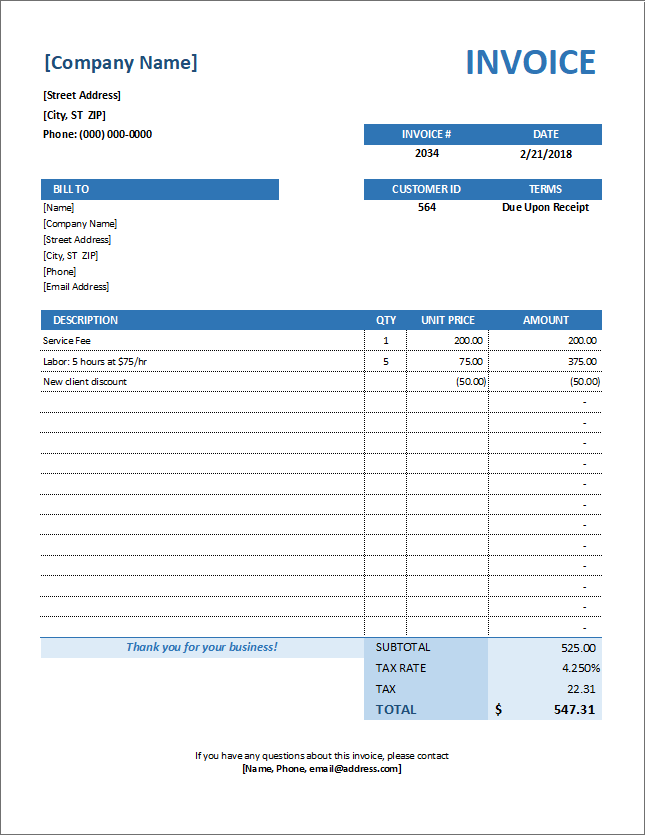

#Service invoicer full
In such cases, the invoices do not necessarily need to contain all the information required for full VAT invoices. An invoice may be required for supplies to private individuals, other than those listed under B2C transactions section above.In some EU countries, in certain cases, invoicing obligations may be more - or less - extensive. new means of transport supplied to another EU country ( Article 138(2)(a) VAT Directive).distance selling when taxable in another EU country ( Article 33 VAT Directive).B2C transactionsĪ business must issue an invoice when it supplies certain goods to a non-taxable person (generally a private individual) in these cases: Other exempt transactions ( Article 135(1)(h)-(l) VAT Directive, including transactions relating to land)ĮU countries may choose not to require an invoice where these transactions are supplied in their territory. the supplier is based in their territory or supplying the services from fixed premises in their territory.these services are supplied in their own territory or outside the EU and.However, EU countries may require an invoice where: No invoice is required if the service is supplied in another EU country. Exempt financial & insurance services ( Article 135(1)(a)-(g) VAT Directive) a non-taxable legal entity (local authorities, associations etc.In most cases, invoices must be issued by a business whenever goods or services are supplied to: There may also be specific national rules on transactions requiring an invoice. certain business-to-consumer (B2C) transactions.most business-to-business (B2B) supplies.When is an invoice compulsory?Īn invoice is required for VAT purposes under EU rules in: EU Commission publishes the details of the specific provisions approved by each EU country on its website. National rulesĮU rules provide flexibility for EU countries to make national choices.
#Service invoicer free
Businesses are generally free to store invoices where and how they like (paper/electronic, in a different EU country to where they are based, etc.)Ī detailed explanation of EU-wide invoicing rules is provided in Explanatory notes.Businesses can outsource invoicing operations to a third party or to the customer (i.e.However, e-invoicing will become obligatory in public procurement. Businesses are free to issue electronic invoices subject to acceptance by the recipient.Electronic invoices are equivalent to paper – national tax authorities cannot require businesses to provide any notification or to receive authorization.The EU rules can be found in the VAT Directive: in certain areas, national rules set by the individual EU country.a single set of basic EU-wide invoicing rules ( Articles 217-240 VAT Directive), and.Taxable persons doing business in the EU are subject to: What information must an invoice contain?.TESI found in EESPA an active association that fully understand Providers needs and involving each member to discuss and decide about supply and financial value chain and related services policies in an international framework. orders, invoices, desadv etc.) between companies and business partner respecting their mutual trading needs. The EESPA MIA allows TESI to create connections with many European service provider delivering business transactions (e.g. Following the EESPA recipe there is MIA (Model Interoperability Agreement) a magical ingredient strategic to grow the ability of buyers and suppliers to exchange invoices and other supply chain documents in a secure and reliable way that supports their mutual trading needs. Speaking of growth, TESI has been growing steadily, providing comprehensive worldwide solutions to its customers, especially in Europe. EESPA helped European service providers to tighten operational alliances by creating a propitious environment for its member’s business growth and making structural networking between members and national and international institutions. "EESPA plays a crucial role strengthening and enlarging the scale and the scope of cross-border digital business transaction in Europe and worldwide.


 0 kommentar(er)
0 kommentar(er)
